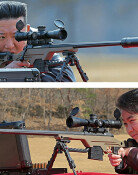[Editorial] North Korea Facing Famine Again
[Editorial] North Korea Facing Famine Again
Posted October. 24, 2008 07:55,
North Koreas harvest is usually in full swing at this time of year. The countrys farmers, however, are far from pleased with their dire situation. According to the charity organization Good Friends, the ruling Workers Party in Pyongyang ordered that three to five months of harvested crops go to farmers and the rest for the military.
The World Food Program yesterday warned of a humanitarian crisis in North Hamgyong and Ryanggang provinces and certain parts of South Hamgyong Province unless more international aid is sent. The U.N. affiliate had also urged immediate assistance in May based on a survey of 53 counties in North Korea, saying many lives were at stake due to an extreme food shortage crisis. The agency, however, uses the expression humanitarian crisis to refer to a more serious famine than extreme food shortage crisis.
Though the communist regime is expected to receive 100,000 of the 500,000 tons of food from the United States in mid-November, the Norths worsening food problem will likely linger. To matter matters worse, other countries are also showing signs of reducing their assistance due to the global financial crisis. North Korea is no longer part of the U.S. list of countries sponsoring terrorism, but this alone cannot resolve its food problem.
North Korean authorities reiterate that the North overcame a food shortage catastrophe in its March of Ordeal from 1995 until 1997. Pyongyang says it can manage again without outside help. Public sentiment, however, has greatly changed. Everyone in the North faced starvation a decade ago, but now, the haves and have-nots are divided and in bitter conflict. Donjus, who have accumulated wealth through the market, are fueling price hikes for rice by monopolizing the market. The privileged class is stocking food in expectation of another March of Ordeal.
There is only one way out. Pyongyang should faithfully follow the second phase of denuclearization it promised to alleviate foreign distrust of the regime and amend its strained relations with Washington and Seoul. The North is bullying the South, threatening to cut all ties unless the South upholds agreements reached at last years inter-Korean summit without precondition. This can only be discussed, however, after the Norths denuclearization is verified.







